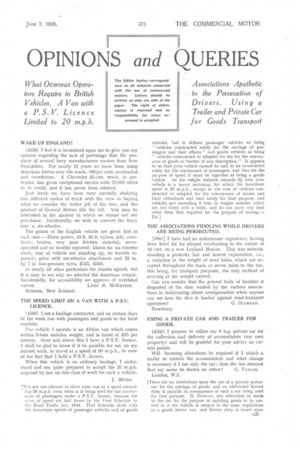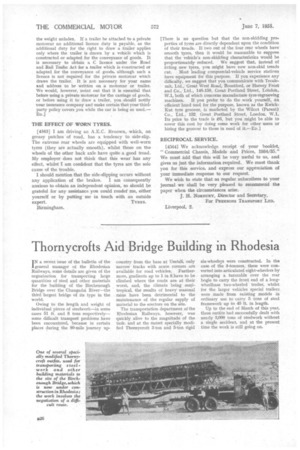OPINIONS and
Page 39

Page 40

If you've noticed an error in this article please click here to report it so we can fix it.
WAKE UP ENGLAND!
l4559l 1 feel it is incumbent upon me to give you my opinion regarding the lack of patronage that the products of several lorry manufacturers receive from New Zealanders. For nearly 15 years we have been using American lorries over vile roads, 100 per cent, overloaded,. and overdriven. A Chevrolet 35-cwt. truck, in particular, has given exceptional service with 70,000 miles to its credit, and it has never been rebored.
Just lately we have been very carefully studying two different makes of truck with the view to buying what we consider the better job of the two, and the product of General Motors fills the bill. You may be interested in the manner in which we reason out our purchases. Incidentally, we wish to convert the truck into a six-wheeler.
The points of the English vehicle are given first in each case :—Horse power, 24.8, 26.3; valves, side, overhead ; brakes, very poor friction material, servooperated and no trouble reported; fitness for six-wheeler work, rear of vehicle not standing up, no trouble reported ; price with six-wheeler attachment and 32 in. by 7 in. low-pressure tyres, £535, £500.
In nearly all other particulars the chassis agreed, but it is easy to see why we selected the American vehicle. Incidentally, for accessibility we approve of overMad valves. LYNN B. McKENziE. Rotorua, New Zealand.
THE SPEED LIMIT ON A VAN WITH A P.S.V. LICENCE.
[4560] I am a haulage contractor, and on certain days of the week run with passengers and goods to the local markets.
The vehicle I operate is an Albion van which comes within 3-tons unladen weight, and is taxed at 35 per annum. Over and above this I have a P.S.V. licence. I shall be glad to know if it be possible for me, on my market work, to travel at a speed of 30 m.p.h., in view of the fact that I hold a P.S.V. licence.
When this vehicle is on ordinary haulage. I understand and am quite prepared to accept the 20 m.p.h. imposed by law on this class of work for such a vehicle.
J, .MILES.
[Yon are not allowed to drive your van at a speed exceeding 20 m.p.h. even when it is being used for the conveyance of passengers under a P.S.V. licence, because the tes of speed are laid down by the First Schedule to the Road Traffic Act, 1934. That Schedule deals with the maximum speeds of passenger vehicles and of goods . vehicles, but it defines passenger vehicles as being " vehicles constructed solely for the carriage of passengers and their effects," and goods vehicles as being " vehicles constructed or adapted for use for the conveyance of goods or burden of any description. It appears to us that your Vehicle cannot be said to be constructed solely for the conveyance of passengers, and that for the purpose of speed it must be regarded as being a goods vehicle. As the weight unladen exceeds 21tons your vehicle is a heavy motorcar, for which the maximum speed is 20 m.p.h., except in the case of vehicles constructed or adapted for the conveyance of horses and their attendants and used solely for that purpose, and vehicles not exceeding 5 tons in weight unladen which are not fitted with a body, and do not carry any load other than that required for the purpose of testing. ED.] THE ASSOCIATIONS FIDDLING WHILE DRIVERS ARE BEING PERSECUTED.
[4561] I have had an unfortunate experience, having been fined £4 for alleged overloading to the extent of 10 cwt. on a new Leyland Beaver. This was notwithstanding a perfectly fair and honest explanation, i.e., a variation in the weight of wool bales, which are accepted throughout the trade at seven bales to the ton, this being, for transport purposes, the only method of arriving at the weight carried.
Can you wonder that the general body of hauliers is disgusted at the time wasted by the various associations in deliberating about amalgamation when anyone can see how the dice is loaded against road-transport operators? G. Otraiovo. Dewsbury.
USING A PRIVATE CAR AND TRAILER FOR GOODS.
[45621 I propose to utilize my S h,p. private car for the collection and delivery of accumulators (my own property) and will be grateful for your advice on certain points.
Will licensing alterations be required if I attach a. trailer to contain the accumulators and what change. is necessary if I use only the car ; does the law demand that my name be shown. on either? G. TAYLOR. London, W.3.
[There are no restrictions upon the use of a private motorcar for the carriage of goods, and no additional licence duty is payable in consNuence of such a car being used for that purpose. If, however, any alteration be made to the car for the purpose of enabling goods to be carried in it the vehicle is subject to the same regulations as a goods motor van, and licence duty is based upon 1.125
the weight unladen. If a trailer be attached to a private motorcar no additional licence duty is payable, as the additional duty for the right to draw a trailer applies only where the trailer is drawn by a vehicle which is constructed or adapted for the conveyance of goods. It is necessary to obtain a C licence under the Road and Rail Traffic Act for a trailer which is constructed or adapted for the conveyance of goods. although such a licence is not required for the private motorcar which draws the trailer. It is not necessary for your name and address to be written on a motorcar or trailer. We would, however, point out that it is essential that before using a private motorcar for the carriage of goods, or before using it to draw a trailer, you should notify your insurance company and make certain that your thirdparty policy covers you while the car is being so used.— En.]
THE EFFECT OF WORN TYRES.
[4563] I am driving an A.E.C. Renown, which, on greasy patches of road, has a tendency to side-slip. The extreme rear wheels are equipped with well-worn tyres (they are actually smooth), whilst those on the wheels of the other back axle have quite a good tread. My employer does not think that this wear has any effect, whilst I am confident that the tyres are the sole cause of the trouble.
I should mention that the side-slipping occurs without any application of the brakes. I am consequently anxious to obtain an independent opinion, so should be grateful for any assistance you could render me, either yourself or by putting me in touch with an outside expert. TYRES. Birmingham.
[There is no question but that the non-skidding properties of tyres are directly dependent upon the condition of their treads. If two out of the four rear wheels have smooth tyres, then it would be reasonable to suppose that the vehicle's non-skidding characteristics would be proportionately reduced. We suggest that, instead of fitting new tyres, you might have new non-skid treads cut. Most leading commercial-vehicle service stations have equipment for this purpose. If you experience any difficulty, we suggest that you communicate with Tecalemit, Ltd., Great West Road, Brentford, or Harvey Frost and Co., Ltd., 148-150, Great Portland Street, London, W.1, both of which concerns manufacture tyre-regrooving machines. If you prefer to 'do the work yourself, in efficient hand tool for the purpose, known as the HwickKut tyre groover, is marketed by the Wilcot (Parent) Co., Ltd., 152. Great Portland Street, London, W.1. Its price to the trade is £6, but you might be able to cover this cost by doing some work for other users or hiring the groover to those in need of it.—ED.]
RECIPROCAL SERVICE.
[4564] We acknowledge receipt of your booklet,• " Commercial Chassis, Models and Prices, 1934/35." We must add that this will be very useful to us, and gives us just the information required. We must thank you for this service, and express our appreciation of your immediate response to our request.
We wish to state that as regular subscribers to your journal we shall be very pleased to recommend the paper when the circumstances arise.
J. H. NORBURY, Director and Secretary,
For PREESONS TRANSPORT LTD.
Liverpool, 2.




























































































